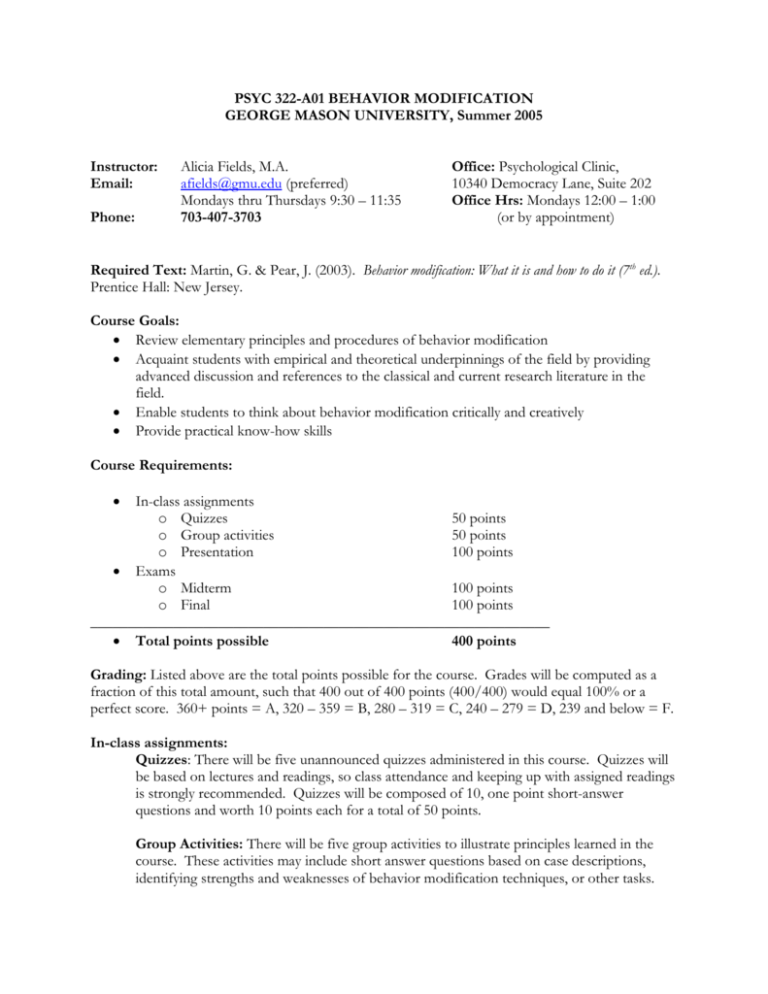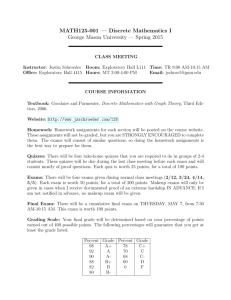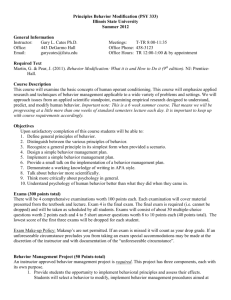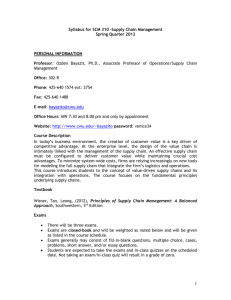PSYC 322-A01 BEHAVIOR MODIFICATION
advertisement

PSYC 322-A01 BEHAVIOR MODIFICATION GEORGE MASON UNIVERSITY, Summer 2005 Instructor: Email: Phone: Alicia Fields, M.A. afields@gmu.edu (preferred) Mondays thru Thursdays 9:30 – 11:35 703-407-3703 Office: Psychological Clinic, 10340 Democracy Lane, Suite 202 Office Hrs: Mondays 12:00 – 1:00 (or by appointment) Required Text: Martin, G. & Pear, J. (2003). Behavior modification: What it is and how to do it (7th ed.). Prentice Hall: New Jersey. Course Goals: Review elementary principles and procedures of behavior modification Acquaint students with empirical and theoretical underpinnings of the field by providing advanced discussion and references to the classical and current research literature in the field. Enable students to think about behavior modification critically and creatively Provide practical know-how skills Course Requirements: In-class assignments o Quizzes 50 points o Group activities 50 points o Presentation 100 points Exams o Midterm 100 points o Final 100 points _____________________________________________________________ Total points possible 400 points Grading: Listed above are the total points possible for the course. Grades will be computed as a fraction of this total amount, such that 400 out of 400 points (400/400) would equal 100% or a perfect score. 360+ points = A, 320 – 359 = B, 280 – 319 = C, 240 – 279 = D, 239 and below = F. In-class assignments: Quizzes: There will be five unannounced quizzes administered in this course. Quizzes will be based on lectures and readings, so class attendance and keeping up with assigned readings is strongly recommended. Quizzes will be composed of 10, one point short-answer questions and worth 10 points each for a total of 50 points. Group Activities: There will be five group activities to illustrate principles learned in the course. These activities may include short answer questions based on case descriptions, identifying strengths and weaknesses of behavior modification techniques, or other tasks. Students will break into groups of 3 or 4 and receive grades based on their work. Specific grading criteria based on the activity will be provided in class. Each activity is worth 10 points for a total of 50 points. Presentation/Paper: Each student will complete a presentation at the end of the course. The last two class periods will be set aside for student presentations. Presentation should be arranged on a poster board or in powerpoint format. (If you plan on using powerpoints let the instructor know ahead of time so a projector can be obtained from the psychology department.) Presentations should be approximately 8 minutes in length. Students have two options as to the presentation type and a paper option each worth 100 points. - Option 1: Describe a behavior to be increased or decreased from your own experience. Give background and answer questions about the behavior to be modified and the individual who is performing the behavior. Identify antecedents and consequences. Design a behavior modification technique to address the behavior and explain how it would be implemented and the results you would expect. Students must obtain approval of their topic from the instructor. - Option 2: Receive a case description from the instructor. Cases from the instructor may be adults or children and will describe a behavior problem to be addressed. Students will be required to describe the case, identify possible antecedents and consequences of the behavior, design a behavior modification technique to address the behavior, and explain how it would be implemented and the results you would expect. (NOTE: Presentations may be done individually or in pairs. However, students who work in pairs must describe TWO behavior modification techniques to address their problem.) - Option 3: Students who are reluctant to do an in-class presentation have the option of completing a paper in lieu of the presentation. The paper will describe three behavior modification approaches to address a behavior problem provided by the instructor. The student will describe the problem, identify and describe modification techniques, and compare and contrast their effects. This paper should be 8 to 10 pages typed in APA style. Papers will be due June 21st on the last day of class. Exams: There will be two exams administered in this course: a midterm exam and a final exam. The exams will consist of multiple choice items and one short answer extra credit question. The final exam will be cumulative. If you must miss an exam, you must provide an excuse for the missed exam (i.e. doctor’s note, death notice, etc.). To make up the missed exam you must complete an oral exam with the instructor. WebCT: A WebCT page has been created for this course. WebCT will be used to post announcements, student grades, and assignments. The web address is: http://webct38.gmu.edu. To log in, use your GMU email account login without the @gmu.edu (For example, if your email address is jsmith@gmu.edu, your login is jsmith). Your password is your four digit birth month and day (e.g. January 8th is 0108). Click on the course number (PSYC 322_A01) to enter the page. As course information will only be accessible online, it is strongly suggested that you make sure you have access to WebCT as soon as possible. Class participation: Although class participation grades will not be assigned, regular attendance will be required to complete in-class assignments and stay up to date in lectures. Also, all students are required to attend both presentation days. Students that are absent for either presentation day will receive a 10 point deduction from their presentation/paper for each absence. Class disruptions will not be tolerated. Students that are repeatedly disruptive will receive a zero on any assignments for the day. Extra Credit: Extra credit may be earned by participating in psychology research. Students may volunteer as participants in psychology research being conducted at GMU and receive one extra credit point on their grade for each hour of research participation for a total of up to 5 extra credit points. You may sign up for experiments at www.experimetrix.com/gmu. If you are unable to participate in research, yet would like to earn extra credit, please see the instructor for more information about other extra credit opportunities. Special Needs: If you require accommodations for a disability please inform the instructor at the beginning of the course and provide documentation from the GMU Disability Resource Center. Honor Code: All assignments are expected to be completely original work by the student. Students may use books, notes, and other sources in preparing written work. Quotes should be used sparingly in papers and always appropriately referenced. Under no circumstances should papers or quizzes be collaborations between students. Collaborative presentations are only allowed as described in the syllabus. All other collaborations are considered plagiarism and will not be tolerated. Plagiarism or collaboration between students during exams or on a paper will result in a grade of zero for the exam or assignment and the university authorities will be notified. Note regarding communication with the instructor: It is strongly preferred that email be used to contact the instructor with any questions. Also, feel free to ask questions during the class period, after class, or during office hours. Please use your GMU email account to contact the instructor. To reduce the spread of viruses, any emails from unrecognized, non-GMU accounts will be deleted upon receipt. Class Schedule Class Date 1 2 3 4 5 6 7 8 5/23 5/24 5/25 5/26 5/30 5/31 6/1 6/2 6/6 9 10 11 12 6/7 6/8 6/9 6/13 13 14 15 16 17 18 6/14 6/15 6/16 6/20 6/21 6/23 Topics Part One - Principles Introduction and Areas of Application Increasing and Producing Behaviors Decreasing Behaviors Discrimination, Generalization No class – Memorial Day Fading, Shaping, Chaining Punishment and Escape/Avoidance Respondent Conditioning Midterm Exam Part Two - Applications Stimulus Control Behavioral Assessments Assessment cont’d & Research Treatment Programs Presentation Topics Distributed Self-Control and Desensitization CBT & History Ethics Presentation Day 1 Presentation Day 2 / Paper Due Final Exam 9:30a – 11:30a Assignments/Readings Chapters 1 & 2 Chapters 3 & 4 Chapter 5, 6, 7 Chapter 8 & 9 Chapters 9, 10, 11 Chapters 12 & 13 Chapters 14, 15, & 16 Chapters 17 & 18 Chapters 19 & 20 Chapters 21 & 22 Chapters 23 & 24 Chapters 25 & 26 Chapters 27, 28 & 29 Chapter 30






